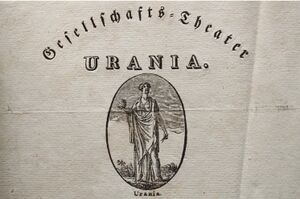Theatergesellschaft Urania
Theatergesellschaft Urania (1792-1944) was a Berlin-based theatre association. Over its long history of existence it developed from a small group of amateur performers to one of the most important German amateur theatre associations of the 19th century.

History
Urania was founded in 1792 by eight young people interested in reading and performing drama. Their first performance was "Menschenhaß und Reue" by August von Kotzebue that later became a signature piece of the theatre association performed at important occasions such as jubilees. The first members belonged to the lower middle classes - involved were shopkeeper assistants, servants, a carpenter and music students. Their first performance venue was located in the private home of the musician Baumann, Zimmerstr. 65. In 1797 they rented a small theatre (ca. 17,5m x 5,8m) with one theatre box in the middle and galleries to the sides that was newly built after their needs in the Kommandantenstr. 72. In 1802 a new theatre venue was created at the same location hosting up to 300 spectators.
In 1834 a new theatre venue was built at the same location, it was named Strilack-Theatre after the landlord Urania rented from. The big auditorium hosted up to 600 spectator, this is a comparable size to today's Gorki Theatre in Berlin. At this historical moment Urania's theatre was the fourth largest theatre venue (after the Royal Opera, the Royal Theatre and the Königstädtisches Theater) in the city. The theatre association firmly established itself in this theatre venue that also comprised meeting spaces, a ball room and changing rooms. In 1871 though Strilack's heirs canceled the contract with Urania and from then on the theatre association lacked a proper theatre venue, moving to different temporary venues over the next years. During the final period of the theatre association it was hosted by the architects' union in Berlin allowing them to set up a movable theatre stage on performing nights. During the year 1944 the association was gradually dissolved due to war detriments. It remains unclear when exactly their activities ended.
Repertoire
Bourgeois drama and light drama dominated Urania's repertoire. Plays from August von Kotzebue and August Wilhelm Iffland were most popular for Urania and other amateur theatres in Germany. Particular small one-act plays and other easy pieces that Kotzebue specifically wrote for amateur theatricals (Almanach dramatischer Spiele, 1803-1820) were often performed. But also lighter opera genres, like Singspiel and opera buffa were sometimes performed depending on musical skills of the membership and the economy of the association that needed to pay for extra musicians and singers.
Membership
In 1794 Urania had 16 full members, from 1802 on the number of members were around 60 dividing the membership between performing and non-performing members from then on. Due to an increase in the cost of the member fees the social strata of membership shifted towards middle and upper middle class until the end of the 19th century. Amongst the early members was the family of the famous composer Albert Lortzing. His parents started their acting career here, and also Albert Lortzing performed on Urania's stage as a child. Many famous actors of the time can be linked to Urania as their 'training ground' for a professional career. There was a constant flow of Urania-trained amateur debutants to the Royal Theatre and other court theatres in Germany.
In the beginning all members also performed on stage, with a growing membership a division between theatre audience and performing members was established. Women were not allowed to become full members until 1893 but were involved as 'performing ladies' from the beginning. They were allowed to also take part in all social activities of the association but did not have any voting rights or the right to participate in the weekly 'conferences'. Full members received a number of tickets for their family members and also had the possibility to invite friends by adding them to the 'foreigners' list' (guest list). Often this guest list became the object of negotiations since it opened up a possibility to freely distribute tickets to a wider public. The association though had a keen interest of keeping their status of 'private theatricals' always being under close scrutiny of the police authorities. Also any rumor of a free sale of tickets brought them into trouble with the competing Royal Theatre, often its directors tried to limit the private and amateur theatricals in the city because of a fear that their own business be damaged.
While full members enjoyed democratic rights (voting, free speech, participation) within in the frame of the theatre association, Urania set strict limits for working class people and members of the Jewish community. They were not allowed to enter the theatre association until 1871 when the national constitution of the German Reich set a new frame for full citizenship for all groups of society.
Prominent Members of Urania
- Carl Friedrich Rungenhagen (musician, composer)
- Albert Lortzing (composer)
- Carl Duncker (publisher)
- Louis Angely (dramatist, actor, director)
- Friedrich Haase (actor)
- Pauline Ulrich (actress)
- Ernst Possart (actor)
- Richard Kahle (actor)
- Max Loewenfeld (actor, theatre manager)
- Luise Wolff (actress)
- Adalbert Makowsky (actor)
- Paul Brock (actor, director)
- Louise von Holtei (geb. Rogée, actress)
Sources
- Motschmann, Uta, "Die private Öffentlichkeit - Privattheater in Berlin um 1800," in Der gesellschaftliche Wandel um 1800 und das Berliner Nationaltheater (= Berliner Klassik. Eine Großstadtkultur um 1800, 15), ed. by Klaus Gerlach, Hannover: Wehrhahn, 2009, S. 61–84.
- Wagner, Meike, "Das Spiel der Liebhaber. Ästhetische Bildung im bürgerlichen Amateur-Schauspiel," in Forum Modernes Theater, Heft 1, 2020, 7-25.
- Wagner, Meike, "Schöpferin glücklicher Stunden…“ – Utopische Spielräume von Amateur-Schauspielerinnen nach 1800," in Forum Modernes Theater, Heft 1-2, 2022, 177-190.

